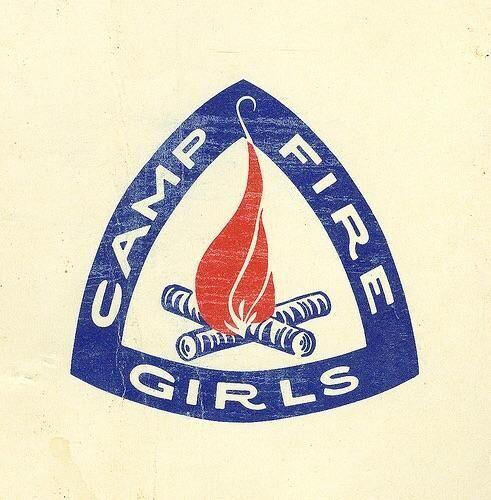
Camp Fire Girls
------------------------------------------------------------------------------------------------------

The Camp Fire Girls logo of crossed logs and flames symbolized
both the hearth fire of the home and the camp fire of the outdoors.
Submitted photo
------------------------------------------------------------------------------------------------------
Until 1912, there had never been a
widespread leisure time activity
program for girls. That year saw Camp Fire Girls incorporated
as a national organization. From the start, the group chose
an insignia of crossed logs and flames, symbolizing
both the hearth fire of the home and
the camp fire of the outdoors.
In 1916, the Womans Club of Huntington
sponsored the
formation of a Camp Fire program here. The Huntington
Council of Camp Fire Girls was incorporated in 1924
and became a charter member of the Cabell-Wayne
Community Chest, the predecessor of today’s
United Way of the River Cities.
The new Camp Fire group immediately began
a summer
camping program, first at a riverbank site on the Ohio,
then on the Guyandotte River at Barboursville.
Something bigger and better was needed, so the
council bought 27 acres of land known as the
“the old Keyser farm” near Salt Rock.
Additional land was purchased later
for a total of 62 acres, capable of
accommodating 100 campers.
Drawing on the region’s history, the new
camp was
named “Dekanawida” a Native American word
defined as “a resting place by the
joining of two streams.”
Over the years, the local Camp Fire
program steadily grew
with members in 10 counties in West Virginia, Kentucky
and Ohio. Recognizing this expansion, the Huntington
Council of Camp Fire Girls was reorganized as the
Tri-River Council. In 1970, the national Camp
Fire organization decided to go co-ed. Soon
the ranks of campers at Dekanawida
included boys as well as girls.
Over the years, Camp Fire provided summer
camp experiences
and weekly club programming to thousands of youngsters in
the Tri-State. But coming up with the necessary funding
was always difficult for the Tri-River Council. The
council’s continued fiscal woes forced it to
sell the Camp Dekanawida property. In 1996
the council reluctantly disbanded.
-----------------------------------------------------------
Note: This Article and picture appeared in the Herald-Dispatch Newspaper on Aug. 8, 2023.
-----------------------------------------------------------
[ Back ]